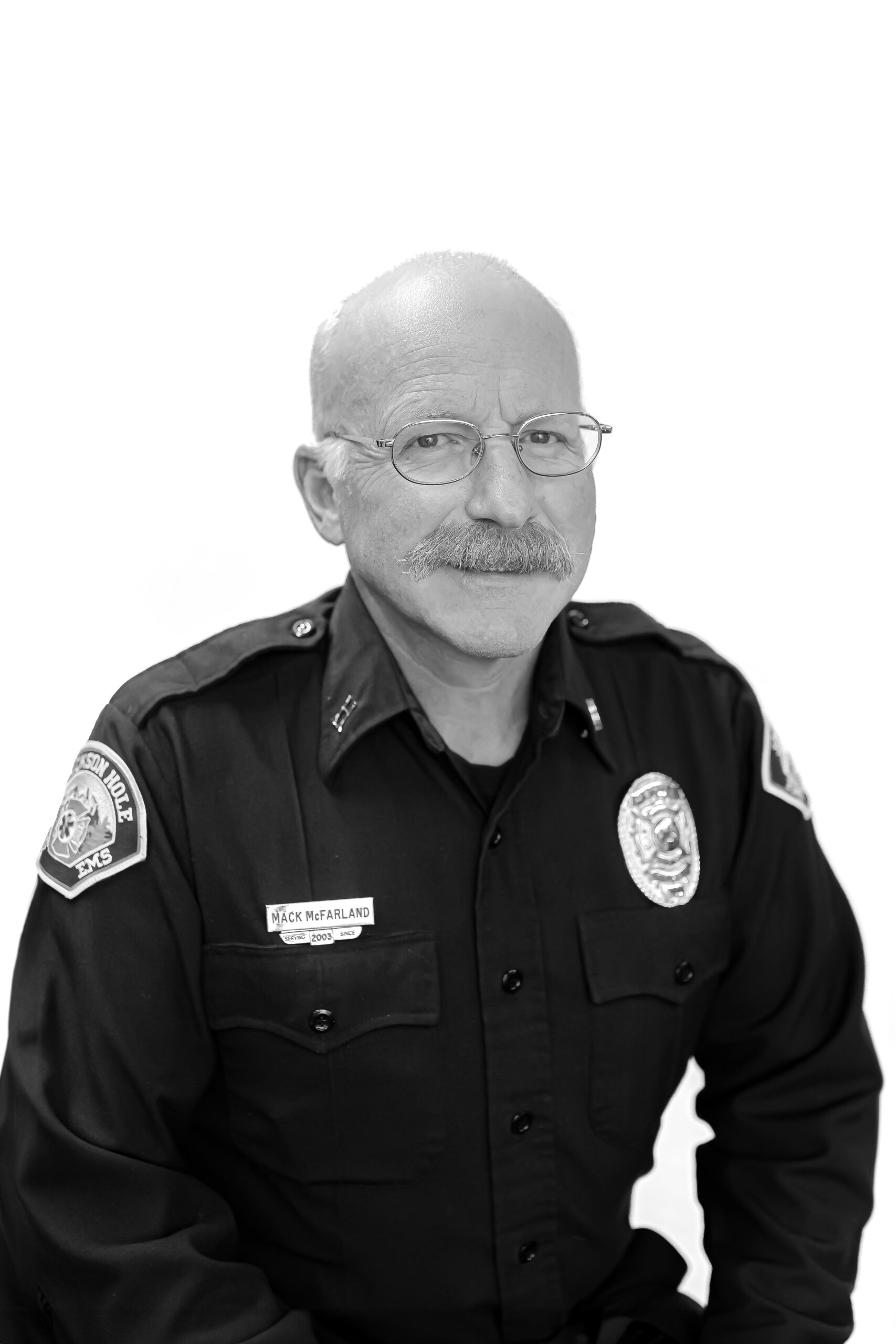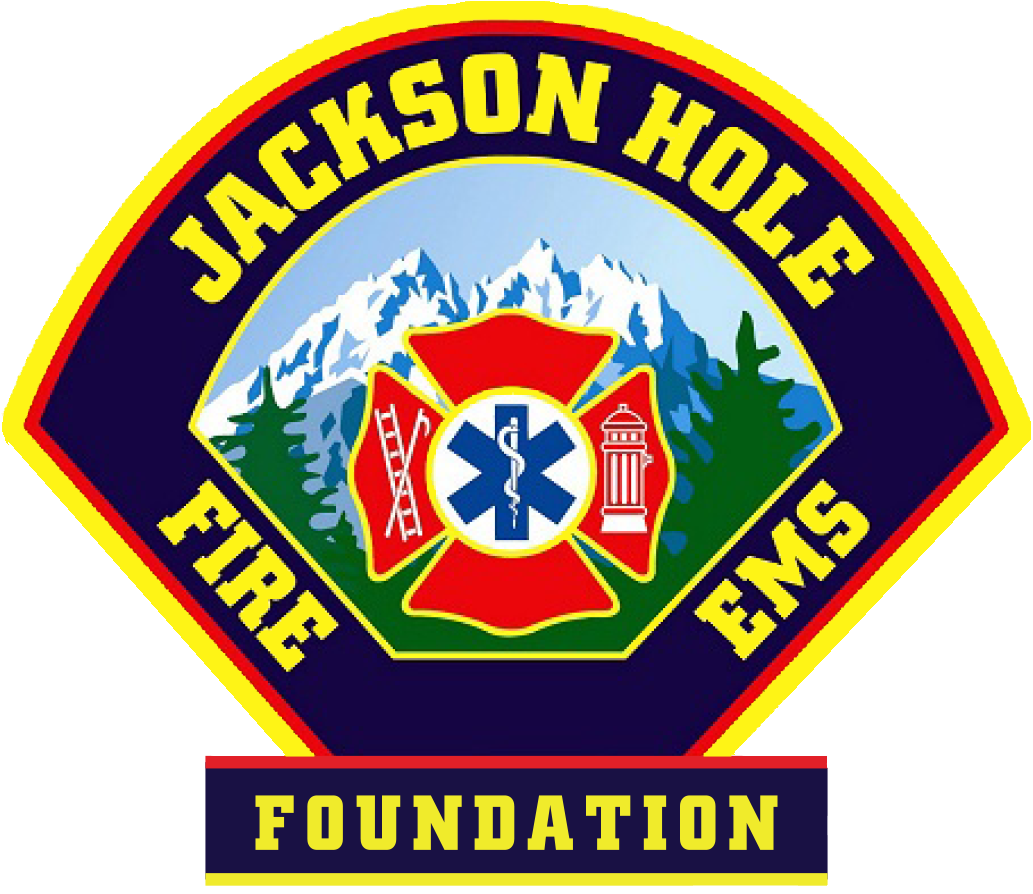
“You have to be comfortable being uncomfortable. You have to be willing to push yourself, to challenge yourself, and that is how we grow and gain skills in this occupation.”
Mack McFarland
Mack McFarland
Volunteer Captain
Present
Where are you from? I’ve lived in Jackson since 1990, so it feels like I’m from Jackson, but I graduated from high school in Cleveland, Ohio.
How did you make it to Jackson initially? Originally it was because of a family vacation. I found the Yellowstone ecosystem when I was in high school, around 16. I thought I’d like to get back here so I applied for a student conservation program in 1984 which got me further inspired to explore this ecosystem. I went to Colorado State for college right out of high school and studied wildlife biology.
What is your role in the department? I’m a volunteer station captain for Station 4. I help new firefighters figure out how to get trained and mentored throughout the basic training that we provide. I also provide some first response and leadership for the north end of the county.
How long have you been a part of JH Fire/EMS? I went through the basic wildland fire training in 1994; I used that to be on the volunteer department in Moose. I didn’t join the county department until 2001. Through joining the department up here, at Station 4, I got my EMR. I didn’t get an EMT… I’m not that good at it I don’t think. Being able to provide that first, hands-on patient care…I’m still getting used to it after so many years.
What made you want to join JH Fire/EMS? My initial inspiration to join was because I moved to this new community and I wanted to get to know non-governmental people in my new community.
What are your current certs? EMR. My highest wildland qualification is Type 2 Incident Commander, and then structure fire-wise, I have fire inspector 1 and ADO and probably more.
What are your future goals in the department? To build a succession structure for when I retire, cause it’s getting close! I’m going to keep doing it until the right time, but I don’t know when that is yet. I’m still physically fit and I’m relatively healthy, but this job is hard and it’s better suited for young, vigorous bodies. I’ve got a daughter in college at Colorado State in Fort Collins, so I’ll probably stick around for another couple years while she’s there.
How do you and your family cope with this volunteer position? Well…I’ve been doing it for so long that it’s sort of part of the relationship. Being gone for 14 to 21 days throughout the summer every 2 to3 weeks definitely takes a toll. It’s really difficult when you’re on call a lot. My daughter, now that she’s older, has come to enjoy it when I’m gone I think.
What do you do for work? I’m the Wildland Fire Safety Program Manager for the National Parks Service. I started that position in August of 2021. So I have 20 years in wildland fire and another 5 years as the safety officer for the park (Grand Teton National Park).
What do you do in your free time? I have a horse and a mule, and I love to get out. I live right across the street from the Bridger Teton National Forest, so I like to go out for a ride and explore the countryside. I hunt and fish and in the winter time, it’s climbing up snow-covered hills to ski down ‘em. I try to stay active with the Grand Teton National Park’s hasty SAR team.
What is your favorite part of volunteering? It’s the crew at the station, that’s the best part. Being able to help out neighbors is super rewarding, but building and being a part of a team is something that turns me on, and as a remote worker, I don’t get a lot of in-team time. Being a part of a team, being able to mentor and lead and learn from these new members is my favorite.
What about the most challenging? I think it’s probably the uncertainty of when that next call is going to come in. It’s probably also seeing change in the department over the years. I definitely like the in-community part, but that’s another challenge: you’re helping people that you’re friends with. You just can’t predict it, but fortunately we have good training and you can go into work mode and just try to do what needs to be done at any moment.
What advice would you give new recruits? Be careful, you might love this more than anything else. I also try to encourage them to understand that they’re learning skills, whether it’s structure fire or EMS skills, that they will never forget, that will help them through all aspects of their life. Sometimes it takes years, but the skills that we learn in Fire/EMS, dealing with people, working in a team, making time-sensitive critical decisions in a dynamic environment…the most elaborate corporate training in the world won’t give you that. This job will.
What do you wish you had known when starting? Keep all your certificates, they come in handy later! I was so excited to be a part of the fire service because of what I learned in the wildland fire side, I didn’t look backwards at all, I just wanted more and more and more of it all the time. I would tell myself to keep all my certs and to learn from the old timers.
What is the most valuable skill or trait for someone to have in this line of work? A trait would be self confidence and a can-do attitude, and the skill would be the ability to deal with a variety of personalities: people skills.
What do you think you bring to the department? Perspective from the federal side, and maybe a broader perspective. I bring some history of the department, and I hope I bring a demonstration of station leadership.
Who is/was your mentor? When I started it was folks that are no longer even alive. My first boss in GTNP was Len Dems, the wildland fire management officer. During my first structure fire training, we went out to Kelly and there were two cabins on parks service land, right by the school. The county was going to burn them down for the parks service, so they had me put on an SCBA and I was hooked. I said, ‘this is it? This is what we do?’ There was no proficiency training or anything; it was the good old days I guess. People expected you to just figure it out. Len Dems got me to that level of proficiency. He gave me the bait and got me hooked from the beginning. Folks like Paul Cody who was the chief at Station 4 encouraged me quite a bit while I was a probationary member, and Chief Watsabaugh helped me reinvest when it would have been easy to walk away.
You have to be comfortable being uncomfortable. You have to be willing to push yourself, to challenge yourself, and that is how we grow and gain skills in this occupation. I still get butterflies when I go to live fire training. It’s part of being on a team, it’s part of testing yourself and making sure that you don’t let your engine company down as you’re entering into those drills or real scenarios.
